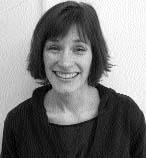
Dr. Julie McQuinn lends the Music History department her own unique mix of knowledge and enthusiasm. (Claude Halter)
Your alarm goes off, and you groan as your feet hit the floor. After a quick tooth brushing and finger combing, you trudge off to your 8:30 class. You won’t need any coffee to wake up, though. You’ve got Julie McQuinn.Doctor McQuinn is Lawrence’s recently appointed full-time tenure-track music history professor. She has spent this year teaching in order to fill a one-year position while Lawrence held a nation-wide search for the position that Julie has just won. She now has the distinction of being Lawrence’s entire music history department.
Julie first heard of Lawrence through two close friends who graduated from LU. By the time she heard of this opening, she knew enough about the Lawrence Difference to decide she would like to teach here. She went through the normal job search procedure, and won the short-term position. It didn’t take long for Julie to decide that she would like the tenure-track position.
Besides the fact that she really loves the Appleton area, Julie also loves the campus atmosphere.
“I think Lawrence rocks,” says Dr McQuinn, adding, “That’s why I wanted to stay so badly. I think the students are great. It’s really nice to have students who are really honestly interested in what I have to say.”
Julie has some pretty exciting plans for the music history department. She would definitely like Lawrence to hire another full time music history professor in the future, which will reduce the size of the classes.
Dr. McQuinn also has many ideas for future course offerings. One course that she is very excited to teach is “Borrowed Music in the Movies.” The course will analyze previously composed pieces of music, such as Barber’s Adagio for Strings, and how its prominence in movies has changed our perception of that piece of music, and how that piece of music affects how we feel during the movie in which it is used.
Dr. McQuinn would also like to teach courses on Stravinsky, early music, and even a course on musical settings of fairytales. She already teaches a course on Claude Debussy, which is offered third term this year.
Though Julie is very excited about her upper level courses, she doesn’t neglect her survey classes in the least. She works very hard to structure class in such a way as to encourage students to want to learn more.
Dr. McQuinn says, “When you teach survey class, there’s a million ways to do it. You have to make a decision. My purpose in class is to expose the student to as many diverse views as possible. That’s going to prepare you best for your life in music. I want you to come out of survey going ‘Oh my God, there’s so much that I don’t know, and I want to go find it out.'”
Julie also tries to stress that music of the past is not just some artifact to be observed from afar, but that we interact with music all the time.
She says: “the context of music changes, and that’s why I make a big deal at the beginning of class about saying, ‘don’t forget that we can never escape ourselves’ You come into my class with so many preconceptions You have to be aware of that all the time.”
But of course, music isn’t the only thing that Julie does. Her other loves include gardening (“Flowers make me so happy”), and dogs (“I love dogs, ‘LOVE DOGS’ capital all letters”). Julie is also a huge reading enthusiast. She highly recommends novels by Murakami (“If you like weirdo stuff”) and Charles de Lint. More than anything, though, she loves movies. She’s always looking for good film, so don’t hesitate to make a few recommendations.
So what are Julie’s plans for the future? “To be the best teacher that I can be,” she says. Now that sounds like the response of a professor that really belongs at Lawrence.
